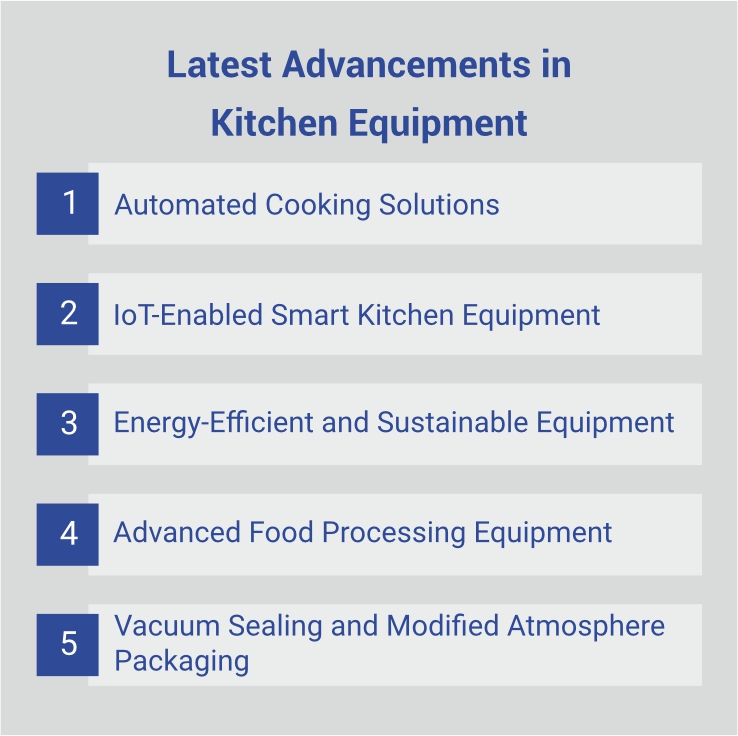Introduction:
Industrial food catering service plays a vital role in India's manufacturing, corporate, and healthcare sectors. With large-scale meal production demands, efficiency, hygiene, and food quality are crucial. The rapid advancements in catering equipment and kitchen technology have revolutionized food service operations, making them more streamlined, energy-efficient, and safer. This blog explores the latest innovations in industrial catering equipment and their impact on efficiency and food quality in India.
Latest Advancements in Kitchen Equipment

1. Automated Cooking Solutions
Modern industrial kitchens in India are witnessing the rise of automated cooking systems that reduce manual intervention and ensure consistency. Technologies such as:
- Automated chapati/roti makers: These machines produce hundreds of uniform rotis per hour, ensuring consistency and hygiene.
- Automated steam kettles and bratt pans: Used for large-scale preparation of curries, dals, and gravies, ensuring even cooking and preventing food wastage.
- Smart fryers and griddles: These use precise temperature control, reducing oil consumption and improving food quality.
2. IoT-Enabled Smart Kitchen Equipment
Internet of Things (IoT) integration in catering equipment allows remote monitoring, predictive maintenance, and real-time analytics. Some of the notable advancements include:
- Smart combi ovens: These ovens use sensors to adjust cooking temperatures and humidity levels automatically, ensuring perfect results for baking, roasting, and steaming.
- IoT-enabled refrigeration systems: Smart refrigerators and cold storage units monitor temperature fluctuations and send alerts in case of deviations, ensuring food safety.
- AI-based food portioning systems: These systems help reduce food wastage by accurately measuring ingredients based on demand and nutritional requirements.
3. Energy-Efficient and Sustainable Equipment
Sustainability is a growing concern in industrial food catering in India. Modern equipment is designed to reduce energy consumption and carbon footprint:
- Induction cooking technology: Highly energy-efficient and faster than conventional gas stoves, induction cooking is becoming popular in industrial kitchens.
- Energy-efficient dishwashers: These use minimal water and electricity, improving efficiency and reducing operational costs.
- Solar-powered kitchen appliances: Some large-scale kitchens are investing in solar panels to power their operations, reducing dependency on fossil fuels.
4. Advanced Food Processing Equipment:
Industrial kitchens require advanced food processing machines to handle bulk operations efficiently. Innovations include:
- Vegetable and meat cutting machines: These reduce manual labor, ensure uniform cutting, and enhance hygiene.
- Automated dough kneaders and mixers: These improve consistency in dough preparation for rotis, breads, and pastries.
- High-speed blenders and grinders: Used for large-scale grinding of spices, masalas, and chutneys, ensuring authenticity in taste.
5. Staff Training and Retention
Catering staff on offshore sites must be well-trained to handle high-pressure environments and follow strict health and safety protocols. However, high attrition rates in the industry can lead to inconsistency in service quality.
- Reducing food spoilage and wastage.
- Enhancing the quality of pre-prepared meals for bulk catering.
- Improving hygiene and reducing contamination risks.
Impact on Efficiency in Industrial Catering
1. Reduction in Cooking Time:
Advanced kitchen equipment like automated rice cookers, bulk steamers, and high-speed ovens have significantly reduced cooking times, allowing industrial kitchens to serve meals faster and meet peak-hour demands efficiently.
2. Consistent Food Quality:
With smart sensors and automation, food preparation is more precise, reducing human errors and ensuring uniform taste and texture in large-scale food production.
3. Minimized Food Waste:
Technologies like AI-based portion control and automated ingredient dispensers ensure that only the required amount of raw material is used, reducing kitchen waste and improving cost efficiency.
4. Enhanced Hygiene and Safety:
IoT-enabled equipment provides real-time monitoring of kitchen conditions, ensuring compliance with food safety standards. Features such as touchless dispensers, UV-based sanitization equipment, and self-cleaning kitchen surfaces enhance hygiene.
Impact on Efficiency in Industrial Catering
1. Nutrient Retention with Smart Cooking Equipment:
Modern steamers, pressure cookers, and combi ovens ensure that food retains its nutrients and flavors, providing healthier meals for workers and employees.
2. Reduction of Cross-Contamination:
Automated food processing and storage equipment help minimize human contact, reducing the risk of contamination and ensuring food safety.
3. Improved Taste and Presentation
Smart fryers, grillers, and baking equipment allow precise temperature and time control, enhancing the taste and visual appeal of food, which is crucial for employee satisfaction in industrial settings.
4. Enhanced Storage and Shelf Life
With advancements in refrigeration and vacuum-sealing technology, industrial caterers can store pre-prepared meals for longer durations without compromising food quality, reducing dependency on last-minute preparations.
Challenges and Future Prospects:
Challenges:
- High Initial Investment: Advanced kitchen equipment can be expensive, making it difficult for small and medium-sized caterers to adopt these technologies.
- Technical Training: Employees need to be trained to use automated and IoT-enabled equipment effectively.
- Infrastructure Requirements: Some high-tech kitchen equipment requires modifications in kitchen design and layout, posing a challenge for existing setups.
Future Prospects:
- Wider Adoption of AI and Robotics: Robotic kitchen assistants and AI-driven cooking systems will further revolutionize industrial food catering services in India.
- Sustainable Practices: More caterers will integrate waste-to-energy solutions, composting systems, and solar-powered kitchens into their operations.
- Integration with Cloud-Based Monitoring: Centralized cloud-based control of multiple industrial kitchens will enhance operational efficiency.
Conclusion
The rapid advancements in industrial catering equipment and technology are transforming food service operations in India. From smart IoT-enabled appliances to energy-efficient cooking solutions, these innovations are enhancing efficiency, ensuring food safety, and improving overall food quality. As the industry moves towards more automation and sustainability, embracing these technological advancements will be crucial for catering businesses to stay competitive and meet the growing demands of India's industrial workforce.
Industries we serve:
Automobile | Manufacturing | Pharmaceutical | Oil and Gas | Healthcare | Ancillary | FMCG | Education | Real Estate | Commercial | Mining | Hotels
Also read: Employee Training and Development in Industrial Catering

